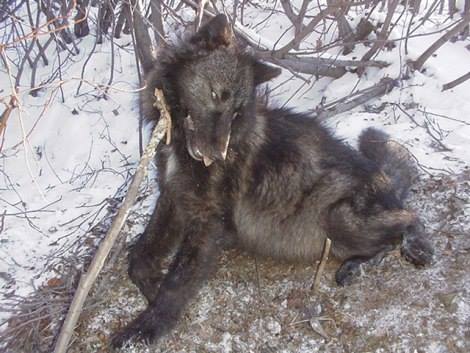
Image from a Different Snare Case
A Fine of 3000 dollars… for 600 illegal SNARES… thats about a JOKE!!!
In one of Minnesota’s most extensive trapping cases, two men are accused of running traplines that included more than 600 illegally set snares for wildlife across four Northeastern Minnesota counties.
Douglas Anthony Marana, 70, and Roderick Robert Kottom, 68, both of Chisholm, were each charged Monday with four counts of illegal trapping activities after a two-year investigation by Minnesota Department of Natural Resources conservation officers, according to a criminal complaint filed Monday in State District Court in Duluth.
The complaint states that the investigation resulted in the seizure of 638 illegal snares on trap lines operated by the two defendants.
“That is such a number that it’s unheard of,” said Tom Provost, DNR regional enforcement supervisor in Grand Rapids. “This number of sets has not been surpassed in Minnesota before. Our average for fail-to-attend traps or snares would be one to 10. Ten would be a big number in any other case.”
The charges for each trapper include gross misdemeanor charges of illegally taking or possessing pine marten, otter, fisher or wolverine; misdemeanor charges of failure to check snares daily; misdemeanor charges of using snares larger than permitted; and petty misdemeanor charges of using untagged traps or snares.
The defendants have been summoned to appear in court on April 13. Maximum sentence for conviction on the gross misdemeanor charge is one year in prison and a fine of $3,000. The other charges carry lesser fines.
According to the criminal complaint, the investigation began in December 2014 when Duluth conservation officer Kipp Duncan received a tip about a wolf possibly caught in a trap north of Duluth. Duncan found a wolf in a snare at the location, Provost said. In the same area where that snare was found, according to the complaint, Duncan found numerous other snares matching the snare type and bait used to take the wolf.
That eventually led to the two-year investigation of Marana and Kottom that grew to include a large area of St. Louis County and parts of Itasca, Koochiching and Lake counties. Officers seized 17 fox, two fisher, five snowshoe hares and one deer illegally trapped on the trap lines, according to the complaint. Before the investigation was complete, more than 20 conservation officers were involved, the DNR’s Provost said.
During the investigation, a judge had authorized a search warrant so the DNR could place a mobile GPS tracking device on Kottom’s vehicle. Duncan obtained the warrant on Dec. 20, 2016, and placed the device on Kottom’s vehicle three days later.
“The tracker allowed us to know his travel patterns,” the DNR’s Provost said. “That’s what allowed us to find the 638 snares.”
On Jan. 9, according to the complaint, conservation officers executed search warrants at Marana’s and Kottom’s homes, as well as at a taxidermy shop. During the searches, officers seized five frozen red fox with untagged snares attached and one frozen fisher with an untagged snare attached, the complaint stated. “Untagged” means the trapper’s identification information was not affixed to the snare as required.
During the search of Marana’s house, the complaint stated, officers seized a GPS device that contained data mapping out the various trapping routes of Kottom and Marana.
“That had waypoint data,” the DNR’s Provost said. “They (Marana and Kottom) did a good job of marking their trap sites for us.”
Under state law, trappers must check snares daily. It would be virtually impossible for two trappers to check 638 snares daily, Provost said.
Snares are wire cable loops, typically set close to the ground and affixed to a tree or branch, that cinch tight without releasing around an animal’s neck when the animal attempts to pass through the snare.
The diameter of snare loops must not be larger than 10 inches, according to state regulations. Kottom had been convicted of trapping violations 10 years ago. He was convicted of a gross misdemeanor in 2007 for illegally taking or possessing pine marten, otter, fisher or wolverine in a 2004 incident, according to court records. He was also convicted of misdemeanors in 2007 for failure to check traps or snares.
Marana did not immediately return a call to comment on the charges. Kottom could not be reached for comment.
Source: 2 MN trappers set more than 600 illegal wildlife snares, charges say
